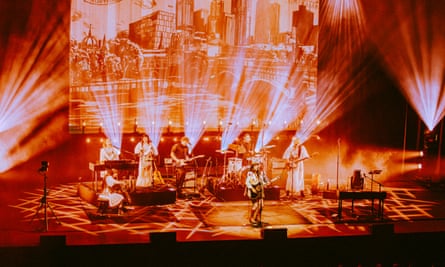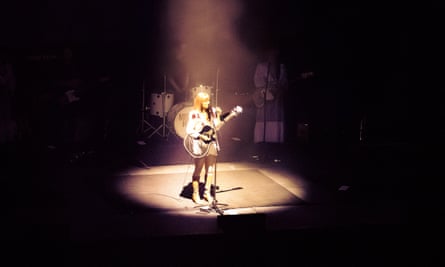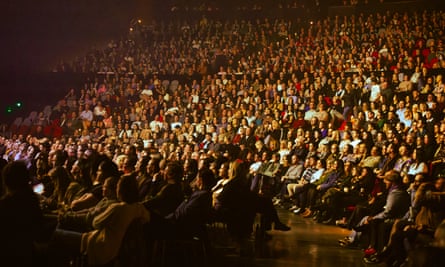There is perhaps no Australian artist as fascinated with transformation as Missy Higgins. Scar, her signature song, explores change under coercion: “A triangle trying to squeeze through a circle / He tried to cut me so I’d fit.” But even her more affirming ballads explore the terrible giddiness of becoming something new. “When you’re young you have this image of your life,” she sings on The Special Two, an ode to the freeing sting of abandoning teenage fantasies for new ones.
Forget the hits, though: the song that most clearly explains the worldview of a singer whose pop culture status has always obscured her cutting-edge strangeness is The River, in which the young narrator tries to wash herself clean, only to discover that flirting with evolution always means flirting with a sort of death.
That obsession with change makes Higgins one of the premier chroniclers of adolescence, those too-brief but eternity-long days where the heart reveals itself anew every second. But it also explains her status as a sly chronicler of queerness – an existence similarly defined by transformation, the desire to evolve into something outside the status quo. There is an entire generation for whom Higgins served as an entry point into queer art. Her first album, 2004’s The Sound of White, blends discussions of platonic, romantic and filial love, with pronoun choices that sent young fans scrabbling for the lyric sheet, checking to see whether Higgins did in fact just sing “she”.
-
Sign up for the fun stuff with our rundown of must-reads, pop culture and tips for the weekend, every Saturday morning
It has been two decades since that debut album – and for the better part of this year Higgins has been touring the country to mark the anniversary. Australia’s finest record of adolescence is no longer an adolescent.
At a Sydney show, held at the International Convention Centre, her transformations took centre stage. The tour has been billed as a gig of two halves: in the first, a mostly solo Higgins plays songs from throughout her catalogue; in the second, she plays The Sound of White from start to finish.


But at the ICC there is no real division between the two sets. In both, Higgins plunges into the same river she has swum in for two decades. Songs from her forthcoming album, The Second Act – a pained investigation of the breakdown of a relationship – blend with ballads that have rattled around queer circles for years. And all operate at a nearly overwhelming emotional register, trembling back and forth between heartbreak and operatic excitement.
after newsletter promotion
Which is, in its way, extremely queer. Melodrama is so inherent to LGBTQ+ art because its sheer magnitude captures all the ways we are, and all the ways we could be. Melodrama is ugly, beautiful and decidedly too much – just as queer desire is. When Higgins settles at a piano, dressed in a frilled suit jacket (she describes the tassels hanging from her sleeves as “my flaps”), what pours out is shocking in its extremity. Don’t Ever, a paean to escape, has audience members sobbing and holding one another.
Timelessness is what we aim for in art and Higgins’ music is timeless because – as she repeatedly acknowledges in her own onstage banter – life is nothing more than an act of deciding who you are, over and over and over again. As it turns out, abandoning distant points on the horizons in favour of new ones is what we are here to do.

And Higgins knows this well. When she confirmed in 2007 that she had “been in relationships with both men and women”, it was – as the singer herself pointed out – far less noteworthy a revelation than the ways she had already been creatively baring herself. Higgins’ own love life was beside the point. What mattered was the elusive, ecstatic through-line of transformation that has always been present in her music.
When the gig ends, queers with red-rimmed eyes – myself included – stand outside the ICC’s entrance. A group of fans launch into an a cappella rendition of Scar, their faltering voices overlapping. It’s a decidedly adolescent moment – the kind of thing we all did when we were much younger, when we were convinced we’d only have to spend a few years figuring it all out before we settled down.
We are still figuring it out. Queerness is movement, which means queerness never stops. A group of people, standing huddled together, singing the songs that gave them life, looking for meaning and knowing they won’t entirely find it – well, doesn’t that remind you of who you used to be? Doesn’t that sound familiar? Doesn’t that hit a little too close to home?
-
Missy Higgins’ tour celebrating the 20th anniversary of The Sound of White continues throughout Australia until August
-
Joseph Earp is a critic, painter and novelist. His book Painting Portraits of Everyone I’ve Ever Dated is to be published by Pantera Press
Source: theguardian.com





















